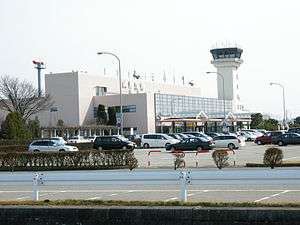Yamagata Airport
Yamagata Airport (山形空港, Yamagata Kūkō) (IATA: GAJ, ICAO: RJSC ) is a 2nd-class airport in Higashine, Yamagata, Japan. The airport is 23 kilometres (14 mi) north of the city of Yamagata.[2]
Yamagata Airport 山形空港 | |||||||||||
|---|---|---|---|---|---|---|---|---|---|---|---|
 | |||||||||||
| Summary | |||||||||||
| Airport type | Military/Public | ||||||||||
| Serves | Yamagata | ||||||||||
| Location | Higashine, Yamagata Prefecture, Japan | ||||||||||
| Elevation AMSL | 345 ft / 105 m | ||||||||||
| Coordinates | 38°24′43″N 140°22′16″E | ||||||||||
| Map | |||||||||||
 RJSC Location in Japan  RJSC RJSC (Japan) | |||||||||||
| Runways | |||||||||||
| |||||||||||
| Statistics (2015) | |||||||||||
| |||||||||||
Source: Japanese Ministry of Land, Infrastructure, Transport and Tourism[1] | |||||||||||
History
Kamiyama Training Airfield was opened by the Imperial Japanese Navy in World War II. It was briefly used by the United States military after the war and then by the Japanese Self-Defense Force as a training facility.[3]
In June 1964, it was turned over to civilian control as “Jinmachi Airport” (神町空港), a third-class regional airport. It was renamed Yamagata Airport in 1965. A helicopter detachment from the JGSDF 6th Division has been based at the airport since 1969. The runway was extended to 1500 meters in 1972, and the airport was re-designated as Class-II in 1979. The runway was further extended to 2000 meters in 1981 and a new terminal building completed in 1984.[4]
Regularly scheduled services began in 1964, with All Nippon Airways operating Fokker F.27 service to Tokyo (Haneda). The service was upgraded to YS-11s in 1972 and to Boeing 737s in 1976.
By 1985 ANA offered five daily flights to Haneda, one of which was operated by a widebody Boeing 767. Japan Air System began service to Osaka (Itami) and Sapporo in 1979. International charter service commenced in 1981, and the airport hosted long-haul charters to countries such as Finland, Hungary, New Zealand and Mexico.[3]
The number of passengers using the airport peaked in 1991 and declined precipitously, particularly on the Tokyo route, due to the completion of the Yamagata Shinkansen in 1992. The Tokyo route saw 470,618 passengers in 1991 but was down to 43,447 passengers in 2002. All Nippon Airways suspended the Tokyo service and withdrew from the airport in 2002, with JAS resuming the route as a single daily MD-87 service in 2003. JAS also operated an Osaka (Kansai) service from 1995 to 2002, and a Fukuoka service from 2006 to 2008, while Nakanihon Airlines operated a summer seasonal Hakodate service from 1998 to 2001.
Currently, the airport is served by JAL and FDA using an Embraer 170 to Tokyo, Osaka and Nagoya.[3]
During the aftermath of the 2011 Tohoku earthquake and tsunami, American troops used Yamagata Airport as a base for transporting fuel and materials to the disaster areas (part of Operation Tomodachi). According to the Ministry of Defense, this was the first time that the U.S. military had used a private airport in Japan for anything other than emergency landings.[5]
Terminal
The airport has a two-story terminal with two boarding gates and a rooftop observation deck.
Airlines and destinations
| Airlines | Destinations |
|---|---|
| Fuji Dream Airlines | Nagoya–Komaki, Sapporo–Chitose |
| Japan Airlines operated by J-Air | Osaka–Itami, Tokyo–Haneda |
Ground transportation
The airport has bus service to Yamagata Station timed to coincide with flight schedules to and from Tokyo, Osaka, and Nagoya.[6]
Sakurambo-Higashine Station is seven minutes by car but is not connected to the airport by scheduled transportation.
References
- "Yamagata Airport" (PDF). Japanese Ministry of Land, Infrastructure, Transport and Tourism. Archived from the original (PDF) on 21 October 2016. Retrieved 7 January 2017.
- Dodd, Jan et al. (2001). The Rough Guide to Japan, p. 252., p. 252, at Google Books
- "2014 山形空港概要" (PDF). 山形県山形空港事務所. Retrieved 28 April 2015.
- "山形空港の概要". Yamagata Prefectural Government. Retrieved 28 April 2015.
- "Japan-U.S. relief efforts expanding," The Daily Yomiuri (Japan). March 20, 2011; retrieved 29 March 2011.
- "Airport Shuttle". Retrieved 28 April 2015.
External links
| Wikimedia Commons has media related to Yamagata Airport. |
- (in Japanese) Home page
- (in Japanese) Yamagata Prefectural Government
- Current weather for RJSC at NOAA/NWS
- Accident history for GAJ at Aviation Safety Network